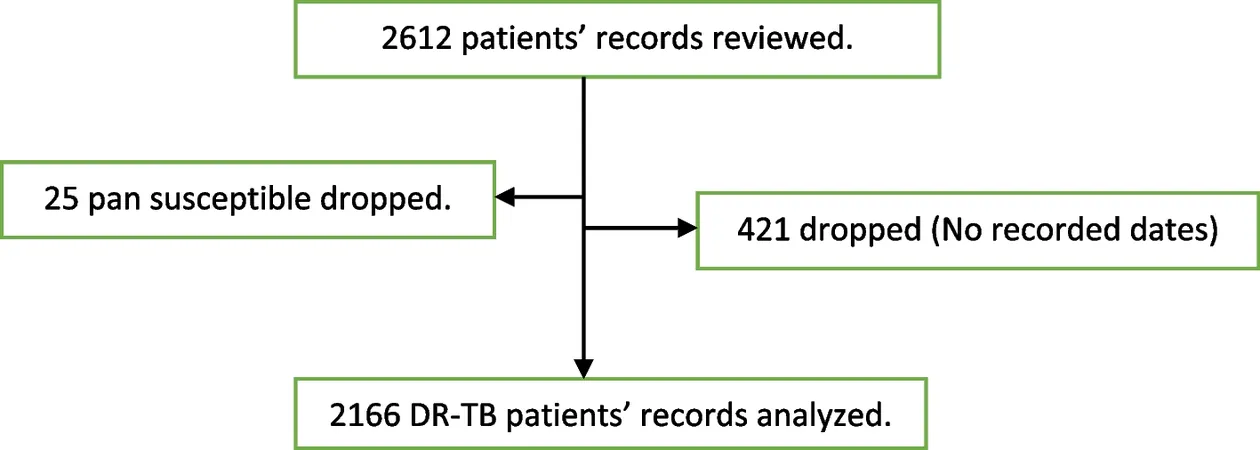
Exploring Treatment Delays in Drug-Resistant Tuberculosis Patients in Uganda – What You Need to Know!
2024-12-20
Author: Siti
Introduction
Drug-resistant tuberculosis (DR-TB) remains a critical global health challenge, and its impact is profoundly felt in Uganda. Despite the existence of effective treatments, delays in initiation can exacerbate morbidity, enhance resistance, elevate transmission risks, and ultimately hinder successful outcomes. A recent study sought to uncover the factors contributing to these treatment delays among DR-TB patients in Uganda, highlighting an urgent need for improvements in health system responses.
Study Overview
Conducted through retrospective analysis of national DR-TB registration data from January 2012 to December 2019, this study encompassed 2,166 patients. Utilizing sophisticated statistical methods, researchers aimed to pinpoint specific demographic and clinical factors associated with delayed treatment initiation.
Key Findings
The study revealed alarming statistics: a staggering 57% of DR-TB patients faced delays exceeding the ideal timeframe of 7 days for beginning treatment, with a median delay of 10 days. Key factors that emerged as significant predictors of treatment delays included: - Patients diagnosed with rifampicin-resistant TB (RR-TB) were 22% more likely to experience delays. - Those with a history of recurrent TB also saw similar delays. Conversely, patients previously lost to follow-up or those diagnosed with pre-extensively resistant TB exhibited a tendency to begin treatment more promptly.
Global Context – A Comparatively Grim Picture
Globally, the challenge with DR-TB remains severe. In 2022, approximately 410,000 individuals developed rifampicin-resistant TB, yet only about 175,650 patients were diagnosed and received treatment—a figure that starkly contrasted with pre-pandemic data. In Uganda, the rates of RR-TB stand at 0.89% among newly diagnosed cases and a staggering 18% among those previously treated.
Implications and Recommendations
These findings underscore the critical need for prompt action among healthcare providers and policymakers. The study advocates for enhanced vigilance in managing patients with a history of TB treatment and those diagnosed with RR-TB. It emphasizes the necessity for future research to explore a broader array of variables influencing these delays, such as geographical accessibility, patient socioeconomic status, and psychological barriers.
Final Thoughts
This study paints a concerning picture, but it also serves as a crucial catalyst for change. By addressing the root causes of treatment delays for DR-TB patients, Uganda can improve treatment outcomes, thereby reducing the public health burden of this formidable disease. Continued focus on innovative solutions and targeted interventions is essential to combat the ravages of drug-resistant tuberculosis effectively. Stay informed and be part of the solution – the health of your community might depend on it!


 Brasil (PT)
Brasil (PT)
 Canada (EN)
Canada (EN)
 Chile (ES)
Chile (ES)
 España (ES)
España (ES)
 France (FR)
France (FR)
 Hong Kong (EN)
Hong Kong (EN)
 Italia (IT)
Italia (IT)
 日本 (JA)
日本 (JA)
 Magyarország (HU)
Magyarország (HU)
 Norge (NO)
Norge (NO)
 Polska (PL)
Polska (PL)
 Schweiz (DE)
Schweiz (DE)
 Singapore (EN)
Singapore (EN)
 Sverige (SV)
Sverige (SV)
 Suomi (FI)
Suomi (FI)
 Türkiye (TR)
Türkiye (TR)